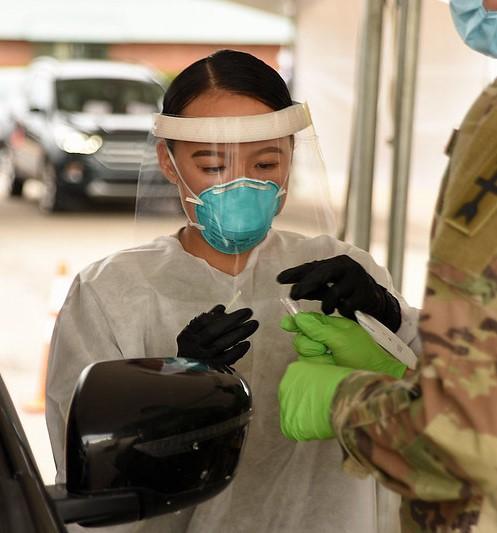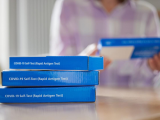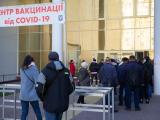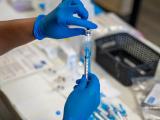With the coronavirus spreading widely throughout the country and hospitalizations and deaths climbing, President-elect Joe Biden today announced a new COVID-19 advisory board to guide his administration during the transition period.
Also today, drug maker Pfizer announced that preliminary data from the large, phase 3 trial of its COVID-19 vaccine candidate, developed with German biopharmaceutical company BioNTech, showed the vaccine was more than 90% effective in preventing COVID-19 in trial participants. The announcement did not include any data from the trial.
Meanwhile, the United States reported 105,927 new COVID-19 cases yesterday, and 457 new deaths, according to the Johns Hopkins COVID-19 dashboard. It was the sixth straight day of more than 100,000 new infections. And today, the country passed 10 million confirmed infections since the beginning of the pandemic. The current total now stands at 10,042,654 infections, with 237,385 deaths.
Biden advisory board
The 13-member Transition COVID-19 Advisory Board will be co-chaired by former US Surgeon General Vivek Murthy, MD, MPH, Marcella Nunez-Smith, MD, MHS, associate dean for Health Equity Research at Yale School of Medicine, and former Food and Drug Administration (FDA) commissioner David Kessler, MD. The group will advise the incoming administration as it plans a federal response to the pandemic that will begin after the Jan 20 inauguration.
"Dealing with the coronavirus pandemic is one of the most important battles our administration will face, and I will be informed by science and by experts," President-elect Biden said in a statement on the Biden-Harris transition website. "The advisory board will help shape my approach to managing the surge in reported infections; ensuring vaccines are safe, effective, and distributed efficiently, equitably, and free; and protecting at-risk populations."
Among the other members of the advisory board are former Biomedical Advanced Research and Development Authority (BARDA) Director Rick Bright, PhD, and Center for Infectious Disease Research and Policy (CIDRAP) Director Michael Osterholm, PhD, MPH. CIDRAP publishes CIDRAP News.
"I'm honored and humbled to be in this group. I think it's an outstanding group of experts in various aspects of responding to the COVID-19 pandemic," Osterholm said. "We're obviously in the earliest days of our efforts here, and I look forward to working on all the aspects of COVID-19 response that the President-elect has laid out in his public statements over the course of the past week."
The Biden-Harris plan to combat COVID-19 focuses on increased testing, full use of the Defense Production Act to boost production of personal protective equipment, working with governors and local officials to implement mask mandates nationwide, and consistent, evidence-based guidance for how communities should navigate the pandemic.
But that plan won't go into effect for more than 2 months, and Osterholm said that if current surge in coronavirus infections continues unabated, those months will be among the most difficult the nation has seen during the pandemic.
"What we're seeing in terms of at-risk behavior in our communities, people readily and willingly swapping air with each other, bodes very poorly for what we're going to see," he said. "I think these numbers could go substantially higher than where we're at right now, and we are already overwhelming our healthcare systems in many states in this country."
Osterholm said 200,000 cases a day is not out of the realm of possibility if Americans don't change their behaviors.
Promising vaccine news from Pfizer
Amid the surge in COVID-19 cases and the uncertainty surrounding the transition stemming from President Trump's refusal to concede, the announcement from Pfizer on its COVID-19 vaccine candidate was a glimmer of good news.
The preliminary data on the mRNA-based vaccine, which uses a synthetic portion of the viral sequence to instruct the body's cells to make the spike protein of SARS-CoV2 (the virus that causes COVID-19), came from a randomized phase 3 trial involving more than 44,000 participants, half of whom received two doses of vaccine and half of whom received placebo. A total of 94 participants from both groups contracted COVID-19, and the data were reviewed by an independent data monitoring board.
In an update posted on the drug maker's website, Pfizer chairman and CEO Albert Bourla, DVM, PhD, said the efficacy data was "the first but critical" step in its efforts to deliver a safe and effective vaccine.
"The results demonstrate that our mRNA-based vaccine can help prevent COVID-19 in the majority of people who receive it," Bourla said. "This means we are one step closer to potentially providing the people around the world with a much-needed breakthrough to help bring an end to this COVID-19 pandemic."
Osterholm said the news was welcome, but added that he would like to know what the 90% efficacy means.
"The real question that hasn't been answered yet, which I will feel more comfortable with in terms of understanding the potential public health impact of the vaccine, is what 90% did it protect against?" he said. "Was it only mild illness? Fever, chills, cough? Or was it against death, severe outcomes, and hospitalization?"
Osterholm said that without that data, public health officials and experts will need to be very careful in determining what the impact will be on the pandemic.
Safety data will also be needed. Bourla said in the update that he believes the company will have enough safety data by the third week of November to be able to apply for FDA emergency use authorization (EUA). The FDA requires at least 2 months of safety data following the second dose of the vaccine for an EUA request.
In a statement on the transition website, President-elect Biden congratulated Pfizer but cautioned that the end of the pandemic is many months away.
"Americans will have to rely on masking, distancing, contact tracing, hand washing, and other measures to keep themselves safe well into next year," Biden said. "Today's news is great news, but it doesn't change that fact."
New restrictions in Utah; Fears of second wave in NYC
In other US news:
- Utah Gov. Gary Herbert announced a state of emergency yesterday following the state's worst week of the coronavirus pandemic, according to the Salt Lake Tribune. New restrictions taking effect today include a statewide mask mandate, a hold on all school extracurricular activities, and a limit on social gathering outside of people in the same household. The restrictions are set to end on Nov 23.
- New York City has reported more than 1,000 new COVID-19 cases a day for 4 straight days, the first time that's happened since May, the New York Times reports. Mayor Bill DeBlasio said the situation was getting "dangerously close" to a second wave, and that it may be time for city officials to review the wisdom of allowing limited indoor dining.






















